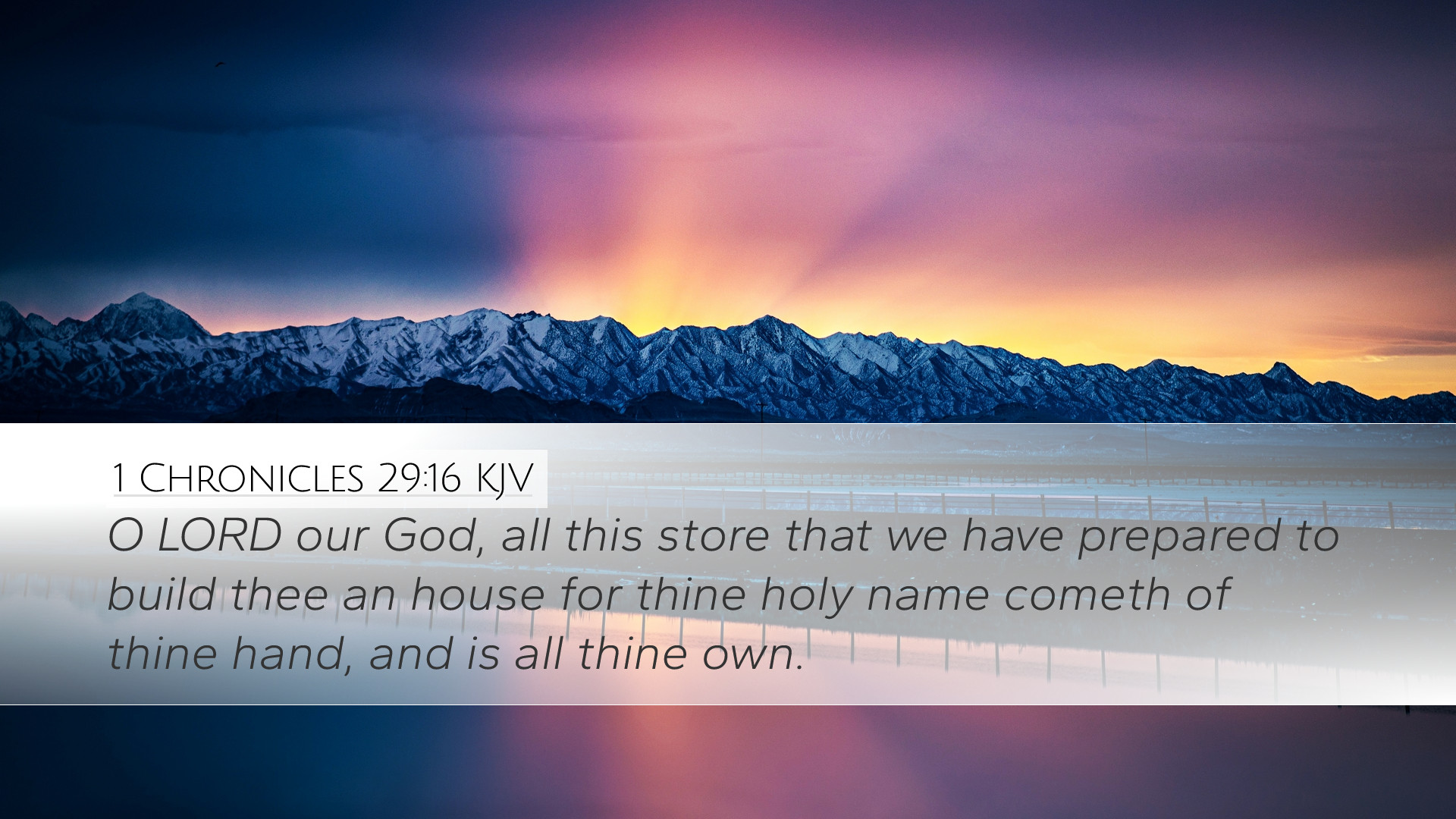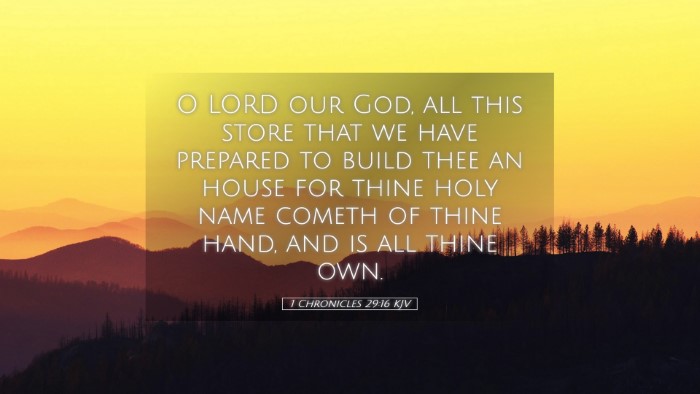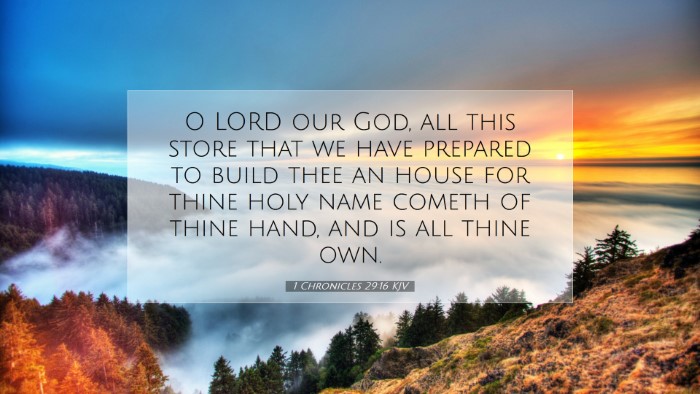Commentary on 1 Chronicles 29:16
Verse: "O Lord our God, all this abundance that we have prepared to build you a house for your holy name comes from your hand, and is all your own."
Overview
This verse, positioned at the conclusion of David’s preparations for the temple, encapsulates the essence of stewardship and divine dependency. David acknowledges that all resources, even those he has prepared for the building of God’s temple, originate from God Himself. This acknowledgment serves as a profound reminder of God’s sovereignty and the posture believers should have towards material wealth and spiritual endeavors.
Insights from Matthew Henry
Matthew Henry emphasizes the humility exhibited by David in this verse. He notes that David does not take personal credit for the abundance accumulated for the temple, instead attributing it entirely to God’s provisions. According to Henry, this reflects a proper understanding of stewardship. Henry writes:
"The wealth we have is a gift from God, and any good we can do with it must be directed to His glory."
Henry also points out that the purpose of the preparations was not merely to honor God superficially but to establish a lasting sanctuary that would bear witness to God’s holiness. The temple was a place where God’s presence would reside, and thus the preparations were saturated with prayerful intention and reverence.
Insights from Albert Barnes
Albert Barnes, in his commentary, further unpacks the significance of God's ownership over all things. He states that David’s acknowledgment of God’s hand in the provision of resources emphasizes the theological principle that all material possessions belong to God. Barnes remarks:
"We can do nothing but what God enables us to do; every good gift and every perfect gift is from above."
He also connects this concept with the New Testament understanding of stewardship, suggesting that it challenges believers to reflect on their own possessions and resources, urging them to utilize them for the advancement of God's kingdom. Barnes stresses the point that true worship is reflected not only in words but also in actions and allocations of wealth dedicated to God’s service.
Insights from Adam Clarke
Adam Clarke’s contributions to this verse emphasize the temporal nature of material wealth and the eternal significance of spiritual offering. Clarke explains that while David prepared great abundance, the focus should remain on the spiritual act of building God’s temple, rather than simply collecting treasures. He notes:
"It is not the excess of the physical abundance that pleases God, but the purity and intent of the heart behind the offerings."
Clarke further elaborates that while accumulating wealth for the sake of glorifying God is commendable, it is crucial that the heart's motivation remains pure and focused on God’s honor. This aligns with Christ's teaching in the New Testament about the heart being a central aspect of our worship.
Theological Reflections
The verse poses significant theological implications about God's sovereignty and the believer’s response. Key reflections include:
- Divine Ownership: Everything belongs to God. Acknowledging this can radically transform our attitude toward resources.
- Worship through Stewardship: How we manage our resources reflects our devotion to God. David’s preparations were an act of worship in their entirety.
- Intent and Purity of Heart: The motives behind our actions are as important as the actions themselves. True worship is a matter of the heart.
- Community Involvement: David’s preparations for the temple encourage communal contributions towards the worship of God, signaling the importance of shared resources in the Christian community.
- Legacy-building: The resources prepared for the temple represent a legacy of faith, reminding us to think about how our contributions affect future generations.
Practical Applications
For pastors, students, theologians, and Bible scholars, this verse encourages several practical applications:
- Reflection on God’s Provisions: Regularly evaluate personal and church resources, recognizing and thanking God as the ultimate provider.
- Encouragement in Giving: Foster a culture of generous giving within the church, emphasizing that resources are for God’s work and glory.
- Education on Stewardship: Teach principles of stewardship that align with biblical teachings, highlighting that stewardship is a form of worship.
- Personal Integrity: Ensure personal financial practices reflect a devotion to God’s principles, modeling integrity and stewardship.
- Focus on Destiny: Inspire the community to view contributions toward God’s work as investments in eternity, cultivating a mindset oriented towards legacy rather than transient gains.
Conclusion
1 Chronicles 29:16 encapsulates deep theological truths about stewardship, divine provision, and the heart of worship. The insights from Matthew Henry, Albert Barnes, and Adam Clarke converge to reinforce that all good gifts indeed come from God, and our responses should not only be acts of gratitude but also deliberate actions towards advancing His kingdom. Engaging with this text invites believers to reconsider their relationship with material resources and to dedicate their lives and possessions to God’s glory.


